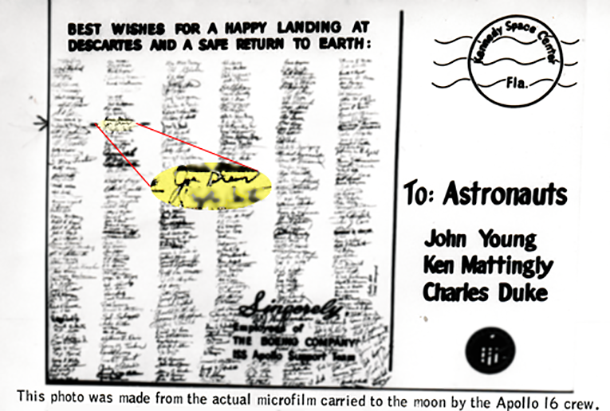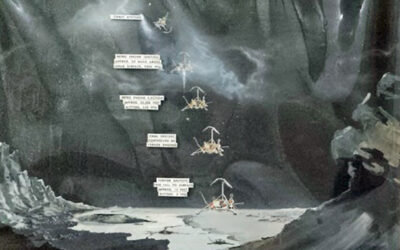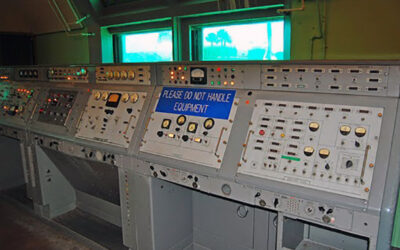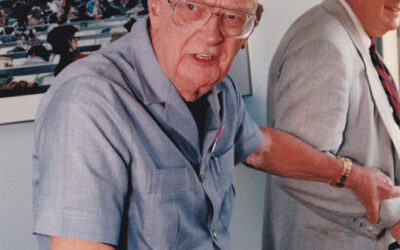MY SIGNATURE rests on the Moon.
While it contributed nothing to the American space program, I get a lot of personal satisfaction from the above. It came about this way.
Shortly before John Young, Charles Duke and Ken Mattingly lifted off on the Apollo 16 mission, many people at the Kennedy Space Center presented them with a ‘bon voyage and good wishes’ card. The physical card was quite large, with hundreds of signatures; and every ounce counts on a lunar lander. The card was reduced to a single microfiche, weighing less than an ounce, and that’s what actually went aboard the lunar lander. (The microfiche itself was photographed, and paper copies distributed to all signers. What you see here is the front of the card.) When the upper half of the lander lifted off to return Young and Duke to the orbiting Command Service Module where Mattingly waited, the microfiche stayed behind in the bottom half.
None of my duties at KSC ever brought me into contact with Duke or Mattingly, but I did meet John Young. He and Robert Crippen (who later became my boss when appointed Director of The Kennedy Space Center) served on the task force preparing the NASA report on the loss of Challenger, where I was the lead writer. Later I invited Young to be keynote speaker at the 1992 World Science Fiction Convention in Orlando (I was on the Con staff as liaison to NASA), and he accepted. When commercial travel arrangements somehow fell through, Young hopped into a NASA jet and flew himself to Orlando. He gave a fine keynote speech, much appreciated by the audience.
I also met Charles Bolden, now the Administrator of NASA. At the time he was a Colonel in the Marines, a fighter test pilot detached to NASA. I spent two days escorting Charley on employee motivation visits, while he was stationed at KSC for a year as astronaut-in-residence. A great guy, Charley, friendly and approachable. He strongly impressed me with his support for education (I worked in the KSC Education Office) and his willingness to speak with anybody. I remember once a janitor, sweeping the floor in the foyer of a building we had just entered, dropped his broom and engaged Charley in conversation. The only relation between the two was that both were black men. After several minutes I had to urge Charley to move on, because we were holding up a large group waiting for us inside.
Charles Bolden returned to the Marines after completing four Space Shuttle missions, two as pilot and the next two as commander. He continued to rise in the ranks, finally retiring as a major general. He came back to NASA when President Obama appointed him Administrator, with an easy confirmation by the U.S. Senate. Now he oversees a NASA that has completed the Space Shuttle program and entered a time of radical change, where private contractors, using their own space vehicles, will soon be ferrying astronauts to the International Space Station.
The only wholly NASA manned space flight program still in work is the Space Launch System (SLS), which will not likely fly its first crewed mission for another decade—if ever. SLS is essentially a larger and more capable Saturn V, with a larger and more capable Orion spacecraft riding on top. The whole ‘bigger and better’ concept has many critics, me among them. I think this program is more likely to be canceled than completed, and actual missions to an asteroid, the Moon and Mars unlikely. I’m disappointed NASA couldn’t come up with a more original and innovative way of resuming human exploration of the inner solar system. Several alternatives have been suggested, but none gotten very far.
Knowing how difficult human space flight really is, I had no expectations that I’d one day take a commercial passenger spaceship to the Moon, and walk over to stare at the Apollo 16 Lunar Module base, still holding the microfiche (hopefully undamaged). But I did think my grandson, perhaps . . . Now I can no longer support even that hope. I’m pessimistic that SLS will survive long enough to put people on the Moon again, and expect that unmanned robots will remain the only way to explore other planets for the foreseeable future. (The fact they are doing incredible work is one of the major arguments for canceling SLS and putting the money into more robots.)
I have no easy solutions to offer that will get humans back into exploring deep space. Wish I did.
Image credit: Courtesy of Joseph Green





0 Comments